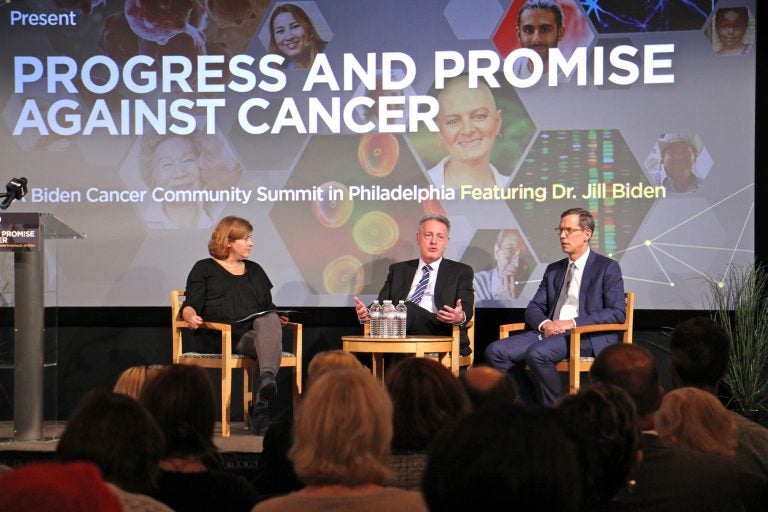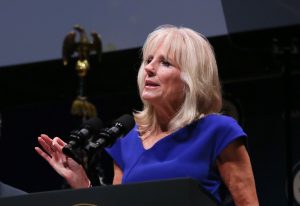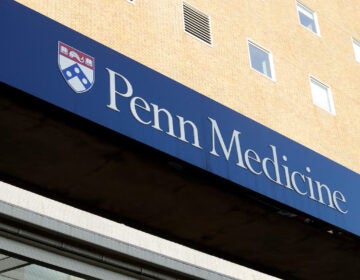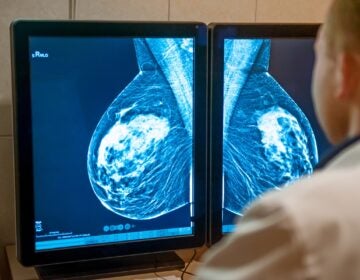Biden Cancer Summit at WHYY highlights advances, disparities in cancer care

Dr. Dario Altieri (center), president and CEO of the Wistar Institute, talks about the road to FDA approval for cancer treatments during a discussion with Abramson Cancer Center Director Robert Vonderheide (right). The discussion was moderated by Maiken Scott (left), host of WHYY's The Pulse. (Emma Lee/WHYY)
Cancer researchers, doctors, and patients gathered at WHYY’s Philadelphia studios on Friday to focus attention on the latest efforts to fight the disease, as part of the Biden Cancer Initiative’s annual cancer summit.
It was one of 450 community events that took place across the country Friday in conjunction with the initiative started by former Vice President Joe Biden and his wife Jill, who lost their son Beau Biden to brain cancer in 2015.
Dubbed “Progress and Promise Against Cancer,” the event highlighted the medical advances that are saving lives, as well as challenges that remain.
The event opened with a story about New Jersey teenager Tori Lee, who was diagnosed with leukemia when she was 5. Two difficult treatment courses of chemotherapy and radiation didn’t wipe out her cancer, so she was enrolled in a clinical trial at the Children’s Hospital of Philadelphia that was testing a new kind of immunotherapy.
Called CAR T-cell therapy, the treatment uses the patient’s own immune cells, called T cells, to fight cancer cells.
“We’re genetically reprogramming [the T cells],” explained Tori’s doctor at CHOP, Stephan Grupp. “And now the cells have learned something new, which is to go after cancer.”
Now a healthy 14-year-old, Tori’s been cancer free for more than five years.
The treatment developed at CHOP was approved by the FDA last year. Several speakers at the summit touted the benefits of immunotherapy, saying that it’s started a revolution in cancer care.

Jill Biden, who grew up in Willow Grove, Pennsylvania, and is now one of Delaware’s most famous residents, traveled to Philadelphia to give a keynote address that emphasized another major theme: making sure everyone has equal access to these life-saving new therapies.
“Progress is uneven,” Biden said. “Rural, black, Latino, and Native American communities all see far less positive cancer outcomes. Poverty draws a line between surviving and succumbing to this disease.”
In addition to high-tech new treatments, speakers called attention to simpler steps that can help prevent cancer in the first place.
“Two-thirds of cancers can be prevented with lifestyle,” said Dr. Ana Maria Lopez, vice chair of medical oncology at Jefferson Health’s Sidney Kimmel Cancer Center.
She said exercise, lowering stress through meditation, and eating a mainly plant-based diet were “a good place to start.”
Cancer doctors also mentioned new avenues of research looking at the needs of cancer survivors, such as Sarah Happy.
The 34-year-old Philadelphia resident shared her story of surviving two types of cancer and surgery for a benign brain tumor. She now lives with chronic pain as a result of her treatment, but she sees a doctor specializing in cancer pain who has helped her keep it under control.
“It’s important that we talk about it so that other survivors know there is support out there in the cancer community, and there are doctors that can help you, and you don’t have to just suffer and get through it alone,” Happy said.
WHYY is your source for fact-based, in-depth journalism and information. As a nonprofit organization, we rely on financial support from readers like you. Please give today.





